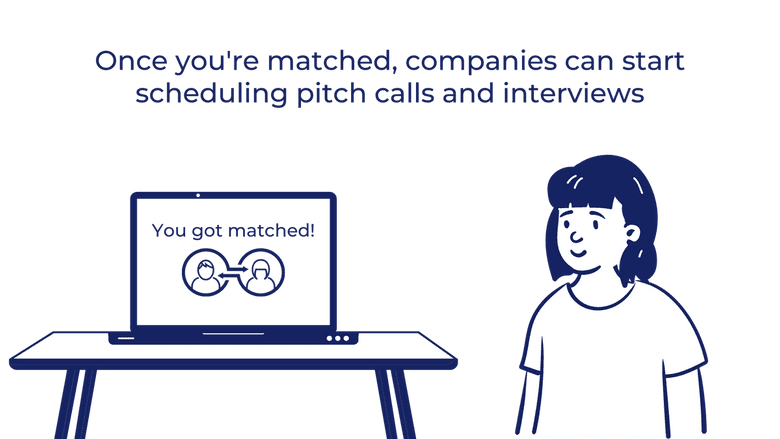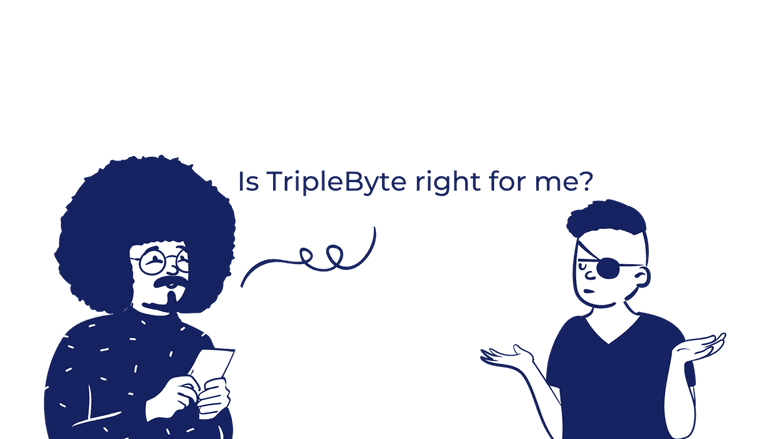Will Triplebyte Land You Your Dream Job?
We look at the full application process to give you the pros and cons of using Triplebyte in your job search.
Well-known for its recognizable Reddit ads, the San Francisco company TripleByte has been trying to change the tech recruitment game since 2015.
Founded on the idea that the software development process does a poor job of evaluating engineers’ strengths, TripleByte covers the beginning interview screening stages of software engineering jobs, at no cost to the candidate. The three co-founders, including Harj Taggar, a former partner at the Silicon Valley startup accelerator Y Combinator, came up with the idea while having difficulty hiring good talent at their companies.
Now TripleByte recruits engineers for over 450 tech companies in the United States, including Apple, Twitch, Uber, and more.
What’s the Process?

If you’re a software engineer looking to get a job through TripleByte, you first need to pass the quiz, which is easily accessible to anyone through the company website.
If you do well enough on that, you’ll be prompted to schedule a 2-hour virtual interview via Google Hangouts. If there are no slots available, you can check a box to ask them to notify you when a time opens up.
Candidates report that the video interviews cover a wide range of topics, including data structures, web systems, basic machine learning, and data exploration, according to Glassdoor reviews.
It’s split up into three sections:
- A practical programming activity or sample app
- A series of short answer questions
- A system design question
Those who have completed the interview seem to agree that it’s very challenging. One redditor called it “The toughest and most thorough interview I’ve ever had in my life.”
While the recruiters will test you on a pretty extensive list of questions, they don’t expect you to know all of the answers. One engineer talked about passing the interview despite saying “I don’t know” to several of the questions.
On the other hand, many developers didn’t make it into the program but later received competitive offers from companies like Google or Facebook on their own.
Many candidates were especially unprepared for some of the language-specific programming questions. While some take this as evidence that the assessment does a poor job of spotting talent, others say it attests to how high TripleByte sets the bar. TripleByte’s website boasts of its low acceptance rate, saying that only 3% of those who take the online quiz make it to the matching stage.
What Happens if You’re Accepted?

Upon acceptance into the program, TripleByte will ask you to fill out an optional form to be sent a jacket and power bank as a gift.
They’ll also send you a list of companies that they’ve matched you with, and you can schedule a quick pitch call with whichever ones you choose. If the company wants to move forward after the call, you’ll skip the initial technical interview and go straight to an on-site, which TripleByte will cover travel and lodging costs for.
TripleByte claims to have a 40% on-site to offer rate, compared to the 20% industry average, making the process more efficient for both recruiters and candidates. While TripleByte is completely free for engineers, companies who use its services have to pay 20-25% of the candidate’s base salary if they’re hired.
Some candidates worry that this extra expense to the company will hurt their negotiating potential, but others argue that the cost is negligible since TripleByte saves companies time and money by finding strong hires.
Who’s It For?

Based on the difficulty and practical knowledge requirements of the interview, TripleByte is often seen as a tool for candidates with a lot of development experience.
Since acceptance into the program is completely based on technical challenges, it can be especially advantageous for ambitious and driven developers who don’t have a lot of accolades that would stand out to a hiring manager.
The TripleByte website showcases a success story from a high school graduate who planned to do an internship during his gap year before college but instead got a full-time software engineering offer through TripleByte. Before going through their process, he encountered an obstacle in his job search-- how to demonstrate his qualifications without any professional experience.
“Being resume-blind and focusing only on skills is the complete opposite of that,” he said. “The resume-blind aspect was the linchpin of everything that I do now.”
Potential Privacy Drawbacks

Recently on Hacker News, someone posted an email from TripleByte that said they would soon make profiles public, giving current users a week to opt out.
Developers speculated that this decision was made in an attempt to compete with recruitment companies like LinkedIn. TripleByte advertises confidentiality on the front page of its website, saying,
“We will not share any information about you with companies until you’re ready. We will also ask you for companies to block in case your current or past employers are on our platform.”
However, this new development would likely give employers the ability to see if any of their employees were part of the TripleByte database and therefore looking for jobs elsewhere. Someone claiming to be TripleBye CEO Ammon Bartram joined the conversation on Hacker News to defend the decision, comparing it to companies like Stack Overflow, HackerRank, and AngelList who make user profiles publicly available. Another commenter countered,
“You are not Stack Overflow. You are Ashley Madison.”
By releasing the personal information of its 200,000+ engineers, TripleByte could potentially be putting thousands of jobs at risk.
Other Considerations

In its original model, Triplebyte would pair you with a talent agent to help you through the application, interview, and negotiation process. This year (2020), all talent agents were laid off and the Triplebyte service model is changing. However, the cost to employers is not. It's still free for applicants.
Additionally, some engineers argue that Triplebyte only has small companies and startups. While that seems to be the case predominantly, they also have a number of larger employers like Stripe.
If you’re in the market for a new job, you can be confident that the TripleByte interview process is legit and respected by competitive employers. Their extensive list of partner companies can introduce you to small firms and startups that you never would’ve looked into, and skipping straight to the on-site can save you lots of time in the long run. However, while candidates in-between jobs can apply to the program risk-free, if you’re worried about your employer finding out, you might want to think twice.
The information provided herein is for general informational purposes only and is not intended to provide tax, legal, or investment advice and should not be construed as an offer to sell, a solicitation of an offer to buy, or a recommendation of any security by Candor, its employees and affiliates, or any third-party. Any expressions of opinion or assumptions are for illustrative purposes only and are subject to change without notice. Past performance is not a guarantee of future results and the opinions presented herein should not be viewed as an indicator of future performance. Investing in securities involves risk. Loss of principal is possible.
Third-party data has been obtained from sources we believe to be reliable; however, its accuracy, completeness, or reliability cannot be guaranteed. Candor does not receive compensation to promote or discuss any particular Company; however, Candor, its employees and affiliates, and/or its clients may hold positions in securities of the Companies discussed.
